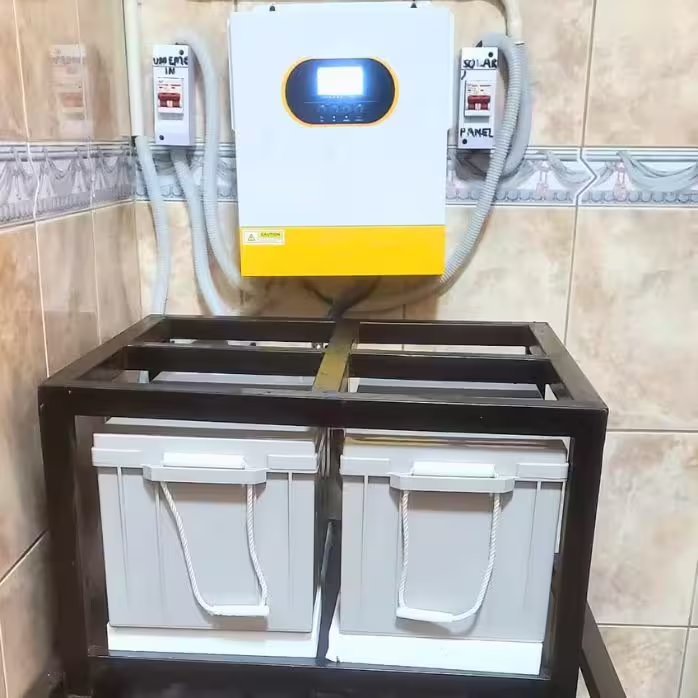Solar Batteries in Uganda
Solar Batteries in Uganda – Reliable Power Backup from Easy Power

Don't Let Power Cuts Affect Your Life
If you’ve ever been left in the dark by a power cut, you know how frustrating and costly it can be. At Easy Power, we help you stay connected and powered up with high-quality solar batteries that store your energy and keep your home or business running – even when the grid goes down.
We supply and install Lithium Iron Phosphate (LiFePO4) and Gel solar batteries across Uganda, giving you a cleaner, more reliable, and longer-lasting power backup solution.
Our Best-Selling Solar Batteries in Uganda
We focus on Lithium and Gel batteries – both trusted options for solar backup systems in homes, shops, clinics, and offices. Here’s a breakdown of what we offer and how each battery type benefits you.
Lithium Batteries
Benefits
FOR YOU
Longer lifespan –
save money in the long run with a battery that lasts 2–3x longer than AGM or lead-acid options.
More power, less weight
– easy to install and move, especially in rooftop or mobile setups.
Worry-free performance –
automatic protection and zero maintenance.
Ideal for daily use –
great for homes, offices, shops, and anywhere reliable power is essential.
What Our Customers Say
“Easy Power helped me choose the right battery for my home. I haven’t had a blackout since – highly recommend!”
Sarah
Intinda
“Good prices, quick delivery, and friendly service. My gel battery runs perfectly.”
Twine
Mbarara
“Easy power solar systems keep my shop running during power cuts. The lithium battery works perfectly, and their service was fast and professional.”
Martin
Kampala
Reliable backup power –
ideal for lighting, phone charging, TVs, and small appliances.
Safe and quiet –
perfect for use inside homes, schools, clinics, and offices.
Budget-friendly –
lower upfront cost compared to lithium, but still dependable.
Stable Power for Sensitive Devices –
Gel batteries deliver steady, regulated power, helping to protect your electronics from damage
Gel Batteries
Benefits
FOR YOU
Solar Battery Prices in Uganda (2025 Updated Prices)
Lithium battery prices and capacity for your needs:
- 7AH Lithium Battery: 120,000 UGX – Perfect for small electronics and lighting
- 100AH Lithium Battery: 1,000,000 UGX – Ideal for average households
- 200AH Lithium Battery: 2,000,000 UGX – Best for large homes or small businesses
Gel battery prices and capacity for your needs:
- 7AH Gel Battery: 60,000 UGX – Perfect for small electronics and lighting
- 100AH Gel Battery: 550,000 UGX – Ideal for average households
- 200AH Gel Battery: 1,100,000 UGX – Best for large homes or small businesses

Why 10,000+ Ugandan Homes Trust Easy Power Company
At Easy Power Company, we ensure:
- Same-day professional installation
- 6 months of free maintenance service
- 1-year comprehensive warranty
- Expert technical support
- 15 years of excellence in Uganda
- Same-day installation nationwide
- German engineering quality
- Expert technical team
- 24/7 customer support


How Easy Power Helps You Choose the Best Battery
Factors to Consider:
Capacity: We help you determine the ideal storage capacity based on your energy needs.
Depth of Discharge (DoD): We recommend batteries with higher DoD to maximize usable energy.
Efficiency: Our batteries minimize energy loss during charging and discharging.
Durability: We select products with long lifespans and robust construction for Uganda’s climate.
Cost: We provide cost-effective solutions tailored to your budget.
Customized Recommendations Our experts assess your unique energy requirements and suggest the best battery type and capacity, ensuring compatibility with your solar power system.
Our Installation and Support Services
Step 1: Free Consultation
Contact us for a free consultation. Our team will assess your energy needs and recommend the best solar battery solution.
Step 2: Professional Installation
Our certified technicians handle the entire installation process, ensuring your system is safe, efficient, and optimized for performance.
Step 3: Ongoing Maintenance
We offer regular maintenance services to ensure your battery operates at peak performance and lasts as long as possible.
Frequently Asked Questions About Solar Batteries in Uganda
What type of battery is best for solar?
Gel batteries are the optimal choice for solar systems in Uganda because:
- Maintenance-free operation
- Excellent performance in hot climates
- Longer lifespan than flooded batteries
- Safe indoor installation → Contact us to find your ideal gel battery: +256 392 001 947
What are the 4 types of solar batteries?
- Gel Batteries (Best for Uganda’s climate)
- Flooded Lead-Acid
- AGM (Absorbed Glass Mat)
- Lithium-Ion → Learn why gel batteries are perfect for your needs: Book a consultation at +256 392 001 947
How many solar batteries are needed to power a house?
Your battery needs depend on:
- House size
- Power consumption
- Appliances used
- Backup duration needed
For average Ugandan homes:
- Small house: 1-2 100AH batteries
- Medium house: 2-3 100AH batteries
- Large house: 2-4 200AH batteries → Get your free power assessment: +256 392 001 947
What is the difference between a solar battery and a normal battery?
Solar batteries are specifically designed for:
- Deep discharge cycles
- Long-term energy storage
- Consistent power delivery
- Weather resistance → Experience the difference: Schedule a demo at +256 392 001 947
Need more answers? Our experts are available 24/7:
- Call: +256 392 001 947
- WhatsApp: +256 789 931735

